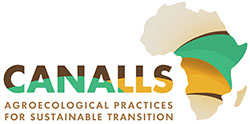Agriculture, a cornerstone of global food security, is highly dependent on natural resources, particularly soil, and is vulnerable to changing climate conditions.
Soil, a non-renewable resource, is essential for agricultural productivity, but its unsustainable use can lead to erosion, nutrient depletion, and degradation. Such degradation not only reduces soil fertility but also exacerbates climate change through the release of sequestered carbon and the loss of biodiversity, ultimately threatening farmers’ incomes, food security, and rural livelihoods.
To combat these challenges, a socio-ecological transformation of agricultural and food systems is urgently needed. Agroecology, defined by the FAO as an integrated approach that applies ecological and social principles to the design and management of food and agricultural systems, offers significant potential in this transformation. Agroecology is not just a set of farming practices but a scientific discipline and social movement that spans across multiple levels—from individual farms to entire agri-food systems. Success in agroecology requires collaboration among stakeholders from politics, science, the private sector, and civil society, alongside an inclusive rural community.
However, despite its potential, there is a critical need for more measurable evidence of agroecology’s economic, social, environmental, and climate impacts. This lack of data has made it challenging to convince farmers, decision-makers, and donors to invest in agroecology. To address this gap, the Deutsche Gesellschaft für Internationale Zusammenarbeit (GIZ) has published a new guidance document aimed at supporting agricultural and rural development programs in advancing agroecological transitions.
This guidance, prepared by HFFA Research GmbH for GIZ’s Global Programme Soil Protection and Soil Rehabilitation for Food Security (ProSoil), provides a comprehensive overview of state-of-the-art methodologies for economic and environmental analysis in the context of agroecology. It outlines the key indicators, data requirements, and application contexts of these methodologies, helping stakeholders to select the most suitable approach for their needs.
The publication also offers practical advice on involving relevant stakeholders throughout the analysis process, ensuring that studies are tailored to the needs of the target groups and that results are actionable. By using this guidance, professionals in ProSoil partner countries can better define their research questions, understand the appropriate methodologies, and select the right research partners for conducting customized studies. Ultimately, this work aims to strengthen the evidence base for agroecology, supporting its broader implementation and helping to build more sustainable and resilient agri-food systems.
This initiative is part of a broader effort under the ProSilience program, co-funded by the European Union, which focuses on fostering agroecological transitions towards resilient agri-food systems.
For those involved in agricultural development, this new publication is an essential resource for understanding and applying the best practices in agroecological analysis, helping to drive meaningful progress in sustainable agriculture.
Read the full study here.



